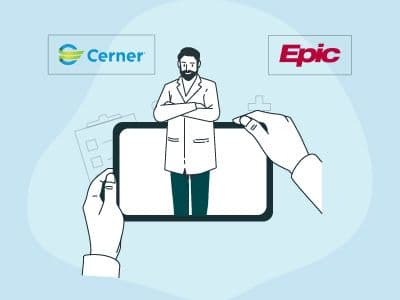Select up to 2 products
Compare Features
Feature List |  Opus EHR | Allscripts EMR | Cerner EMR | AdvancedMD | Practice Fusion |
|---|---|---|---|---|---|
Appointment Management/Scheduling | |||||
e-Prescriptions | |||||
Lab Integration | |||||
Patient Portal | |||||
Mobile App | |||||
Telemedicine | |||||
Billing and invoicing | |||||
Claims Management | |||||
Customizable Forms | |||||
Patient Demographics |
Make decisions with real reviews from real users
Top 10 Opus EHR Alternatives
Finding the right Opus EHR alternative can feel overwhelming. The healthcare software market is filled with options, each offering a variety of features tailored to different practice needs.
Opus EHR is a leading solution for behavioral health practices, offering patient management, scheduling, and billing tools. It is known for its user-friendly interface and specialty-specific templates that streamline workflows.
However, it may not suit every practice due to evolving medical management needs. Limitations such as limited customization and scalability challenges can impact certain organizations.
This article explores 10 top Opus EHR alternatives, evaluated based on key features, pros and cons, and pricing. Let’s dive in to find the best fit for your practice!
Our Best Opus EHR Alternatives Picks
1.athenaOne
athenaOne is an all-in-one EHR, RCM, and patient engagement platform developed by athenahealth to help healthcare providers streamline operational workflows. It leverages cloud-based technology for deployment and offers specialized tools for revenue cycle management, patient engagement, and more. The platform primarily serves medium to large multi-specialty clinics, public health centers, and similar healthcare organizations.
athenaOne stands out for its comprehensive billing, claims management, and robust analytics, making it a strong Opus EHR alternative in the medical software market.
athenaOne Top Features
- Billing Integration
- Analytics And Reporting
- Patient Engagement Portal
- Remote Accessibility
What Are The Pros And Cons Of athenaOne?
Pros | Cons |
|
|
How Much Does athenaOne Cost?
The vendor offers a quote-based pricing model.
2. AdvancedMD EHR
AdvancedMD EHR is a comprehensive EHR and practice management system that integrates multiple EMR functionalities into a single platform. It offers features such as workflow automation, telemedicine capabilities, and patient charting, making it a strong choice for large practices, specialty clinics, medical care centers, and hospital chains.
Compared to Opus EHR, AdvancedMD provides more robust virtual care coordination and patient scheduling, positioning it as a powerful alternative for practices seeking advanced functionality.
AdvancedMD EHR Top Features
- Telemedicine
- Advanced Patient Scheduling
- Payment Processing
- Charting Templates
What Are The Pros And Cons Of AdvancedMD EHR?
Pros | Cons |
|
|
How Much Does AdvancedMD EHR Cost?
AdvancedMD offers three pricing models:
- Software-specific
- RCM
- Build a Bundle
Each option offers add-on features, get customized pricing now.
Disclaimer: The pricing is subject to change.
3. Practice Fusion EHR
Practice Fusion EHR is a cost-effective medical software designed to improve operational efficiency for healthcare providers. It offers essential EHR features within an intuitive, user-friendly interface, making it a popular choice for individual practitioners and smaller practices.
Compared to Opus EHR, Practice Fusion provides seamless workflow management and easy accessibility, making it one of the top Opus EHR alternatives for smaller healthcare organizations.
Practice Fusion EHR Top Features
- Advanced Charting Tools
- Appointment Management
- HIPAA Compliance
- E-Prescription
What Are The Pros And Cons Of Practice Fusion EHR?
Pros | Cons |
|
|
How Much Does Practice Fusion EHR Cost?
Practice Fusion EHR starts at $149/month/provider along with an annual commitment. This includes three signing staff licenses and unlimited non-signing staff licenses.
Disclaimer: The pricing is subject to change.
4. eClinicalWorks
eClinicalWorks is a leading EHR solution offering a wide range of features tailored to healthcare providers' needs. It includes advanced analytics, patient care tools, and external integrations, serving medium to large facilities, such as hospital networks and multi-specialty clinics.
Its comprehensive interoperability system facilitates fast data exchange across departments and seamless integration with third-party applications, making it a top Opus EHR alternative.
eClinicalWorks Top Features
- AI-Powered EHR
- Patient Engagement
- Revenue Cycle Management
- Advanced Analytics
What Are The Pros And Cons Of eClinicalWorks?
Pros | Cons |
|
|
How Much Does eClinicalWorks Cost?
It provides three pricing types:
- EHR Only: $449/month/provider
- EHR with Practice Management: $599/month/provider
- RCM as a Service: 2.9% of practice collections
Disclaimer: The pricing is subject to change.
5. Epic EMR
Epic EMR is a widely recognized provider of practice management solutions, trusted by large healthcare organizations worldwide. Its services support a variety of facilities, including public health centers, academic medical institutions, and multi-specialty clinics. With a comprehensive suite of features, Epic EMR streamlines complex workflows, enhances patient care, and facilitates seamless communication.
While Opus EHR offers broad EHR capabilities, Epic EMR provides greater scalability and integration options for larger healthcare organizations, making it a notable Opus EHR alternative.
Epic EMR Top Features
- Specialty-specific Templates
- Ai-enabled Analytical Insights
- Robust Telemedicine Functionality
- Patient Engagement
What Are The Pros And Cons Of Epic EMR?
Pros | Cons |
|
|
How Much Does Epic EMR Cost?
The software offers feature-based pricing.
6. DrChrono EHR
DrChrono is a cloud-based EHR solution known for its customization capabilities and user-friendly mobile interface. It includes tools for scheduling, patient documentation, and billing, along with telehealth functionalities. Designed for small to medium-sized healthcare practices, DrChrono offers flexibility to meet modern practice needs.
Compared to Opus EHR, which focuses on behavioral health, DrChrono provides a broader range of mobile-friendly tools for practices seeking greater flexibility. Its robust mobile features make it an excellent choice for clinicians working across multiple locations.
DrChrono EHR Top Features
- Customizable Templates
- Billing Integration
- Patient Scheduling
- HIPAA Compliance
What Are The Pros And Cons Of DrChrono EHR?
Pros | Cons |
|
|
How Much Does DrChrono EHR Cost?
It offers the following plans at quote-based pricing:
- Prometheus
- Hippocrates
- Apollo
- Apollo Plus
Disclaimer: The pricing is subject to change.
7. Kareo EMR
Kareo EMR (now known as Tebra) is a widely used EHR solution offering essential tools for scheduling, billing, and telehealth. Its user-friendly interface and intuitive workflows make it a preferred choice for independent and smaller clinics looking to enhance patient engagement and communication.
While Opus EHR is designed specifically for behavioral health, Kareo provides greater flexibility for small practices across various specialties. Its ease of use and all-in-one functionality make it a top Opus EHR alternative.
Kareo EMR Top Features
- Claims Processing Integration
- Medicine Management
- Patient Portal
- Reminder Management
What Are The Pros And Cons Of Kareo EMR?
Pros | Cons |
|
|
How Much Does Kareo EMR Cost?
It offers a quote-based pricing model.
8. Cerner EMR
Cerner EMR (now acquired by Oracle) is a leading EHR platform known for its robust data analytics and strong interface. It offers tools for patient engagement, video and remote consultations, and population health management, making it suitable for both large and small healthcare facilities. Cerner's ability to interface with other systems ensures seamless data sharing, a critical factor for healthcare setups that require interoperability across networks.
While Opus EHR is designed for behavioral health, Cerner excels in data analytics and population health management, making it a better fit for complex healthcare organizations. Its comprehensive data coverage and interoperability make it an excellent Opus EHR alternative for larger practices.
Cerner EMR Top Features
- Real-time Reporting
- Population Health Analytics
- Specialty-specific Templates
- Advanced Patient Engagement Tools
What Are The Pros And Cons Of Cerner EMR?
Pros | Cons |
|
|
How Much Does Cerner EMR Cost?
The software offers flexible pricing plans based on your organization’s requirements.
9. Allscripts EMR
Allscripts (now acquired by Veradigm) is a customizable, open-platform EHR designed for multi-specialty implementation. It supports patient care, revenue cycle management, and telemedicine, with a strong reputation for health information exchange (HIE) and data analytics. Its adaptability makes it suitable for practices of all sizes, particularly those with complex clinical workflows.
While Opus EHR is tailored for behavioral healthcare, Allscripts serves a broader range of medical specialties. Its high degree of customization allows practices to modify templates, clinical workflows, and operational processes, making it a strong Opus EHR alternative for organizations seeking a flexible, interoperable solution.
Allscripts EMR Top Features
- Customizable Templates
- Integration Options
- Multiple Deployment Options
- Patient Communication
What Are The Pros And Cons Of Allscripts EMR?
Pros | Cons |
|
|
How Much Does Allscripts EMR Cost?
Veradigm (Allscripts) ePrescribe offers the following pricing plan:
- Standard Plan: $59 per provider per month
Additional plans are available; for detailed information, please visit Veradigm's official website.
Disclaimer: The pricing is subject to change.
10. Meditech EHR
Meditech is a widely adopted EHR platform in hospital environments, recognized for its ability to manage complex clinical data and workflows. Its strong interoperability with other systems enhances care coordination, making it particularly advantageous for integrated health networks. Meditech primarily serves small to medium-sized healthcare facilities, including hospitals and outpatient clinics.
While Opus EHR is designed for behavioral health and specialty practices, Meditech offers scalability and interoperability suited for hospital systems requiring robust data exchange capabilities. Its comprehensive data-sharing infrastructure makes it a leading Opus EHR alternative for larger healthcare organizations.
Meditech EHR Top Features
- Intelligent Interoperability Tools
- Lab Integrations
- E-Medicine Management
- Patient Engagement Tools
What Are The Pros And Cons Of Meditech EHR?
Pros | Cons |
|
|
How Much Does Meditech EHR Cost?
The software offers quote-based pricing model.
How We Chose Our Opus EHR Alternatives?
Identifying the best alternatives to Opus EHR requires a systematic, data-driven approach to ensure the selections are both relevant and valuable. Here’s the process we used to curate this list:
- Relevance To Healthcare Practices: We prioritized solutions that address key challenges faced by Opus EHR users, such as the need for better integration, advanced analytics, or more budget-friendly pricing models
- Core Features And Functionality: Each alternative was reviewed for its ability to support essential healthcare tasks like e-prescribing, patient engagement, billing, telemedicine, and compliance with regulations such as HIPAA
- Scalability: Recognizing that practices vary in size, we included options suitable for small clinics, mid-sized practices, and large healthcare organizations
- User Feedback: We analyzed authentic user reviews to understand key user pain points for Opus EHR and satisfaction level, ease of use, and overall performance for each Opus EHR alternative
Our approach ensures that this list is both thorough and practical, giving you the tools to confidently choose the EHR solution that best fits your unique needs.
Finding The Right Opus EHR Alternative
Choosing the right EHR system is a critical decision that directly impacts practice efficiency, patient care quality, and financial performance. While the alternatives listed here offer robust solutions, the best choice depends on your specific needs, budget, and practice size. By carefully evaluating these factors, you can select an EHR that aligns with your goals and supports long-term success.
Ready to explore Opus EHR alternatives further? Book a free consultation at (661) 384-7070 today for personalized recommendations!






